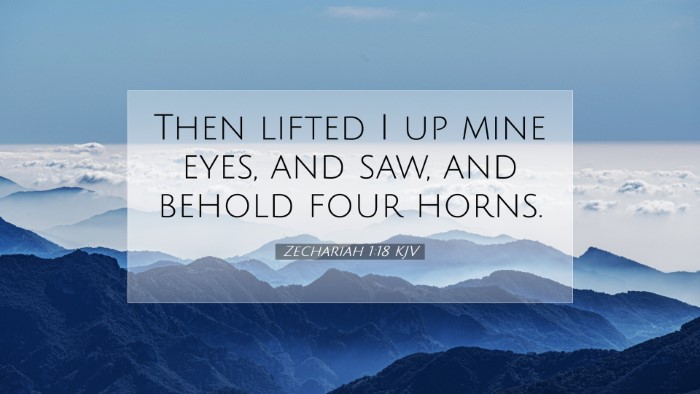Zechariah 1:18 - Commentary and Insights
Verse: "Then lifted I up mine eyes, and saw, and behold four horns."
Introductory Remarks
Zechariah, the author of this prophetic book, was called to communicate God’s messages to the people of Israel during their return from Babylonian exile. This particular verse (Zechariah 1:18) serves as an introduction to a vision involving four horns, which symbolizes the powers that have afflicted God's people.
Contextual Background
The prophetic role of Zechariah is paramount in understanding the landscape of post-exilic Judah. The Jewish people were discouraged from rebuilding the temple and their city, amidst opposition and external threats. Zechariah's visions serve to reassure them of God's sovereignty and His plans for restoration.
Exegesis of Zechariah 1:18
Visual Imagery: The act of lifting up his eyes signifies a shift in focus from earthly concerns to divine revelation. Such an act in biblical literature often indicates the beginning of prophetic insight.
Symbolism of the Four Horns: The number four frequently represents completeness or universality in Scripture. Horns, in biblical symbolism, often denote power or strength. Consequently, four horns can be interpreted as representing the comprehensive might of opposing nations or forces that have bullied God’s people.
Insights from Matthew Henry
According to Henry, the four horns symbolize the nations that were adversaries to Israel, particularly during their captivity and the subsequent return. He emphasizes that God shows His prophets visions to reinforce the faith and hope of His people. The prophetic imagery indicates that these horns—namely Babylon, Medo-Persia, Greece, and Rome—represent worldly powers that will ultimately be dealt with by God's justice.
Insights from Albert Barnes
Barnes adds a layer of understanding by connecting the horns to specific historical enemies of Israel. He expounds that the vision is meant to comfort the Jewish community, assuring them that their oppressors will be held accountable. Barnes argues that the ensuing visions will progressively reveal God's purpose to judge the nations and restore Israel, illustrating divine oversight in the cyclical nature of human conflict.
Insights from Adam Clarke
Clarke emphasizes the significance of vision as a means of divine communication. He interprets the four horns as representing the four major empires that dominated Israel through the ages, emphasizing the cyclical oppression faced by God's people. Clarke notes that the vision serves as a harbinger of hope, prompting scholars to reflect on God's ultimate power over human history.
Theological Implications
- Divine Sovereignty: This verse illustrates that God remains sovereign over all nations, regardless of their immediate power.
- Hope and Restoration: The vision serves a dual purpose—the acknowledgment of oppression and the promise of restoration.
- Call to Vigilance: The imagery encourages believers to remain watchful and faith-filled amidst external challenges, trusting in God's overarching plan.
Practical Applications
As pastors, students, and theologians study this verse, several practical insights emerge:
- Encouragement in Trials: Just as Zechariah's vision provided hope to the Israelites, contemporary believers can find solace in God's promise of ultimate justice.
- Awareness of Spiritual Warfare: The concept of horns as adversarial forces reminds Christians of the ongoing spiritual battles faced today.
- Community Reflection: Churches can engage their congregations in discussions about God's providence amid societal upheaval, drawing parallels with the challenges faced by Zechariah's audience.
Conclusion
In Zechariah 1:18, the vision of four horns poignantly encapsulates the conflict between divine sovereignty and earthly powers. By reflecting on the insights of Matthew Henry, Albert Barnes, and Adam Clarke, pastors and scholars can glean profound meanings and applications for contemporary faith communities. This verse serves not only as a historical reflection but also as a timeless reminder of God's unwavering presence amidst adversity.


